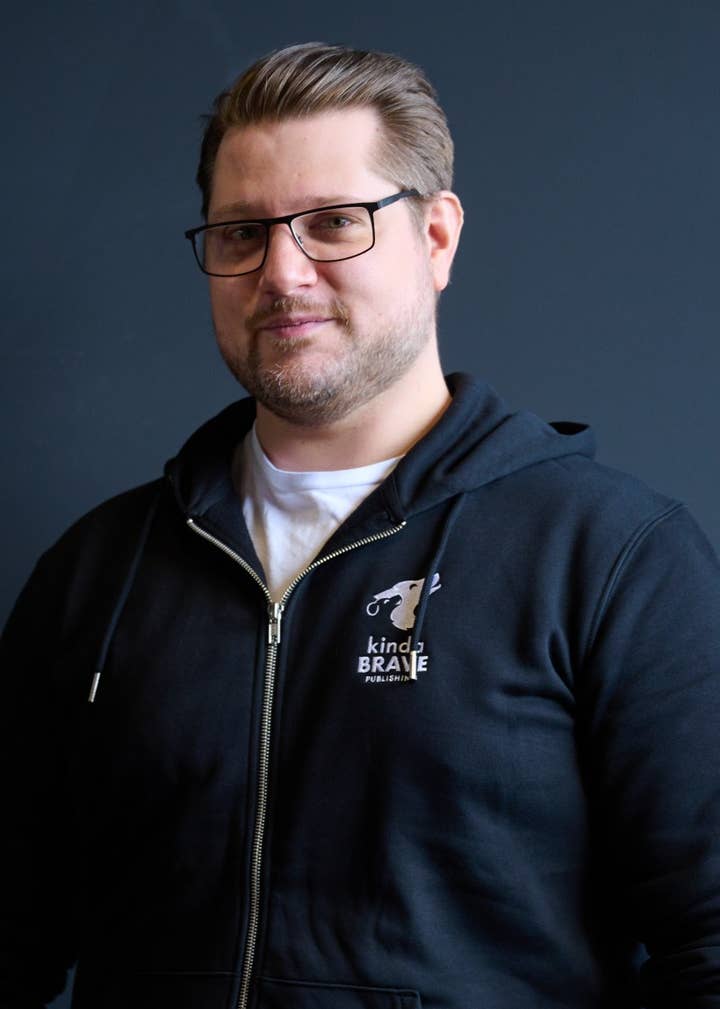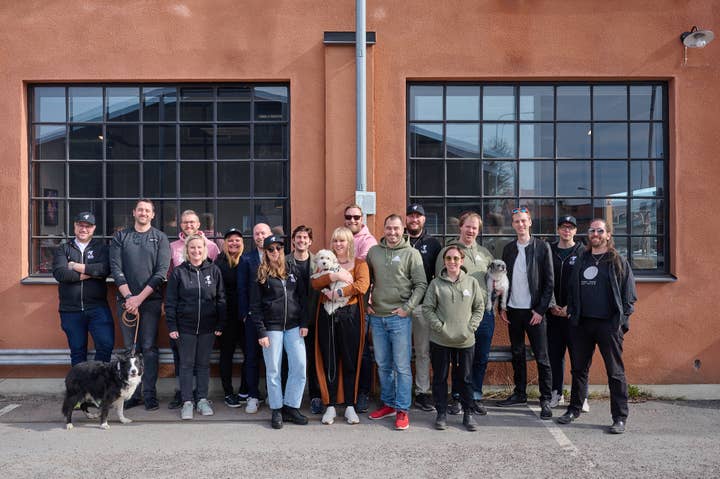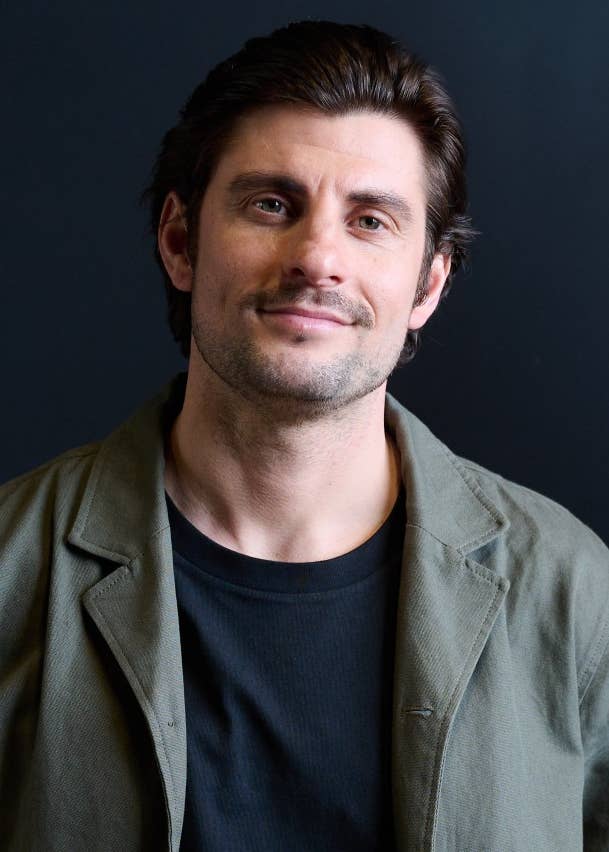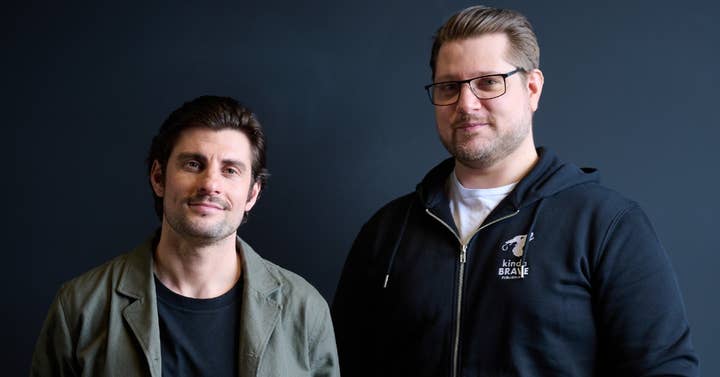New indie publisher Kinda Brave focuses on social and ecological sustainability
Swedish group talks us through its strategies to incubate new studios, diversify the industry and reduce carbon emissions
Yet another new publisher has emerged from stealth today, but this one has several differences in its strategy that it hopes will shake up the industry -- all centred around sustainability.
Based in Sweden, Kinda Brave operates on what it describes as a 'hybrid indie' model, whereby it doesn't sign publishing deals with studios but instead acquires them and shares resources across the group.
The idea is to give indies the structure and support of being owned by a larger publisher, but maintaining the creative freedom to work as they would if they were fully independent. Since its inception, Kinda Brave has raised SEK 60 million ($6.3 million) from investors and signed/acquired three studios, all of which now operate in the same office.
Much of the messaging around the publisher's announcement is around sustainability, and CEO Björn Rudolfsson emphasises that this is not limited to focusing solely on combatting climate change.

"Sustainability is extremely broad -- it's both the planet and also people," he tells GamesIndustry.biz. "There's a social aspect to it and there's an ecological aspect to it. Sustainability is essentially about trying to give back at least as much as you take."
When it comes to climate change, that last part can refer to reducing and offsetting carbon emissions. When it comes to people, it can mean time, money and so on, Rudolfsson suggests.
"As soon as you hire your first person, you are dealing with people's lives," he says. "You realise that you have a massive impact on these people's lives. It's a responsibility."
In Kinda Brave's case, it manages that responsibility by acquiring studios and giving them the support and resources they would not have if they were fully independent. Rudolfsson notes that most indies start out with a lot of 'bootstrapping,' and rarely have things like pensions, insurance and ergonomic work equipment in place. They may not have much knowledge in terms of how to handle finance, HR, legal matters and so on. Studios in this situation can also be caught in a never-ending cycle of chasing funds, securing enough to finance and deliver a project before starting all over again. And, of course, they won't have the resources of a publisher for aspects such as sales, marketing and communications.
"The smaller the team is, the main thing becomes to deliver a game -- all eyes are focused on that," he says. "When all eyes are focused on game development, you lose track of some other things that are also important.
"All these things I list are the stuff that we try to address. When I talk about sustainability, it's taking the template of a standard indie studio and trying to address these issues, trying to raise them, elevate them, and you try to do that over time.
"Dictating to studios how they should make games and add more demands for sustainability is hard. We can provide resources to those studios"
Karim Walldén, Kinda Brave
"It's not just one project or one thing, it's a permanent commitment to the studios that we work with to really make it long term. Studios develop games and we develop studios."
Head of marketing communications and brand Karim Walldén adds: "As we all know, games are an art form. Creators need to have time to tell stories and also make a great game, so dictating to our studios how they should do it and adding more demands for sustainability, for example, is hard. We can provide resources to those kinds of studios and indie developers."
The two emphasise that Kinda Brave's focus on sustainability does still encompass the climate crisis. One of the first hires at the company was a sustainability officer who, among other things, calculates the group's CO2 emissions, researches suppliers and manufacturers to find the 'greenest' partners, monitors the team's travel to ensure it's kept at a minimum, and even sources reusable furniture and other equipment.
Rudolfsson adds that this is another role indie studios are unlikely to be able to support without the resources of a group like Kinda Brave. Meanwhile, Walldén holds up his smartphone during our video call -- a reused and older model of iPhone.
"That sums it up in a funny way," Rudolfsson says. "Sustainability is not always that thrilling or fun. It's not a bunch of grand gestures. It's about a million decisions, and some of those are, quite frankly, boring. It's trying to work on new exciting fun technologies or game mechanics to encourage players to consume less power, but it's also what kind of toiletries we are buying for the office. That is the scope. You can't have a press release about that."

Reducing the impact a games company has on the environment is rapidly becoming a key theme in the industry today. Earlier this week, Gamescom talked us through its plans to become the world's first "climate friendly" games event -- a lofty goal for a show that prompts hundreds of thousands of people to travel across the globe. As we asked co-organiser Felix Falk, can a video games firm truly be climate friendly and sustainable?
"There are things that are within our control but at the end of the day, when we launch a game, you have players playing it and any time they play it they will consume energy and power," Rudolfsson says. "When they are, that is also our responsibility.
"We are looking into things such as eco settings in games, where we reduce the power consumption of our games. We don't know what kind of actual power consumption they have [when they play our games], so we always need to have pessimisitic numbers. The way the world works right now, you need to compensate. So it's carbon emission offsetting. It's not a perfect system, there's a lot of controversy surrounding it, but it is where we are."
"Sustainability is essentially about trying to give back at least as much as you take"
Björn Rudolfsson, Kinda Brave
Walldén adds: "We will have gold standards when it comes to compensating. The group is also exploring how we can look into power, electrical solutions, heating, potential solar panels in the office. There are a lot of things and all of our choices need to boil down to what's best for the environment."
Another area of sustainability Kinda Brave is focused on is gender diversity, with Rudolfsson reporting that the board of directors is already a 50/50 split between men and women -- no small feat given the Swedish games industry's workforce only has 22% of women and non-binary workers.
Kinda Brave is doing its part by sponsoring DONNA, a Swedish organisation focused on bringing more women and non-binary people into games roles. It's also collaborating with RFSL -- the Swedish Federation for Lesbian, Gay, Bisexual, Transgender, Queer and Intersex Rights -- to become the world's first LGBTQI certified gaming company. This essentially means that all staff will go through a six-month certification process and training to ensure recruitment is fair, the right terminology is used, and so on.

The firm also has a focus on accessibility, which we're told is factored early on in the game design process of any Kinda Brave title, with added development time to ensure features are appropriately implemented. Studios and their staff are sent to training in accessibility, and the publishing company pays for certifications so each studio has an accessibility champion. Training and certification will be handled by the AbleGamers charity.
Finally, Kinda Brave is also working on the launch of a website: SustainableGaming.com. This will not only be the place where the company shares its progress -- both achievements and shortcomings, we're told -- but also eventually host educational materials and resources other indies can use to improve their own sustainability.
Kinda Brave is the latest in a long, long line of new publishers to emerge in recent years, but the firm hopes its focus on sustainability attracts the interest of studios it can potentially acquire and encourages change in others. That said, for all its ambitions and ideals, Rudolfsson recognises the new Swedish publisher is entering an incredibly competitive market.
"You need to not just make a good game, but you need to make that stand out," he says. "We're not naive in the sense that while we believe in these things and we have these values... there are commercial considerations to all of this.
"We believe that having this approach is something that will help us stand out or hopefully create better visibility for our games. But at the end of the day, we are not different from anyone else in this industry. If we make crap games, we will not survive."

